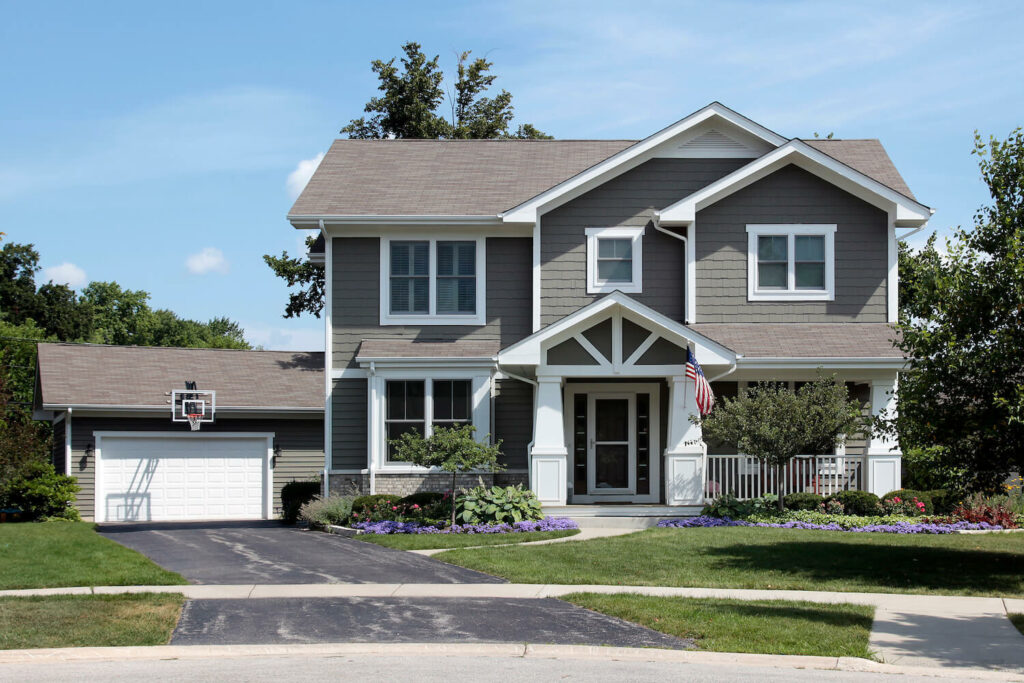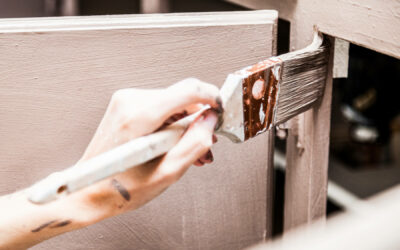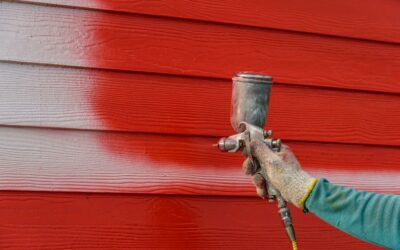
The exterior of your home is the first thing that greets visitors and passersby, setting the tone for what’s inside. A well-maintained and beautifully painted exterior can dramatically enhance your home’s curb appeal and leave a lasting impression. Over time, however, the elements can take a toll on your home’s paint, causing it to fade, peel, or chip. This is when a fresh coat of exterior paint can work wonders in revitalizing your home’s appearance. In this article, we’ll explore the importance of maintaining your home’s exterior paint, the steps involved in the process, and tips for achieving a stunning curb appeal transformation.
The Significance of Exterior Paint
Your home’s exterior paint serves more than just an aesthetic purpose; it plays a crucial role in protecting your home from various environmental factors.
Here are some reasons why maintaining your home’s exterior paint and color design is essential:
- Weather Protection: The exterior paint acts as a protective barrier against the harsh elements, including rain, snow, sunlight, and wind. It prevents moisture from seeping into your home’s structure, which can lead to rot and decay over time.
- Prevents Rot and Decay: If your home’s siding is made of wood, a well-maintained paint job is crucial to prevent rot, insect infestations, and decay. Properly painted wood is less susceptible to these issues.
- Enhanced Durability: Exterior paint not only adds beauty but also adds durability to your home’s surfaces. It can extend the lifespan of your siding, trim, and other exterior elements, saving you money on repairs and replacements.
- Improved Curb Appeal: The aesthetic benefits of a fresh coat of paint cannot be overstated. It can transform your home’s appearance, making it look new and inviting. A well-maintained exterior paint job can also increase the resale value of your home.
The Exterior Painting Process
Renewing your home’s exterior paint is a significant undertaking, but with the right approach and some guidance, it can be a rewarding project.
Here’s a step-by-step guide to help you navigate the process:
1. Siding Inspection and Paint Preparation:
Inspect the Exterior: Begin by carefully inspecting your home’s exterior for any damage or signs of wear. Look for areas where the paint is peeling, cracking, or blistering. Address any underlying issues before painting.
- Clean the Surface: Thoroughly clean the surfaces you plan to paint. This step involves removing dirt, dust, mildew, and any loose paint. A pressure washer or a scrub brush and detergent can be used for cleaning.
- Repair and Replace: Repair any damaged areas, such as wood rot or cracks, before painting. Replace any deteriorated or rotten wood to ensure a smooth and even surface.
- Remove Obstacles: Clear the area around your home, moving outdoor furniture, plants, and decorations away from the walls. Cover plants and landscaping with drop cloths to protect them from paint splatter.
2. Choose the Right Exterior Paint:
- Select Exterior Paint: Choose a high-quality exterior paint that is specifically designed for the surfaces you plan to paint. Different types of surfaces, such as wood, stucco, or brick, may require different types of paint.
- Consider Colors: Decide on the colors you want for your home’s exterior. Consider the existing architectural elements, your neighborhood’s aesthetics, and your personal preferences. It’s a good idea to test paint samples on a small section of your home before committing to a color.
- Calculate Paint Quantity: Measure the square footage of the areas you intend to paint to calculate the amount of paint you’ll need. It’s advisable to buy a little extra for touch-ups and future maintenance.
3. Prepare the Exterior Surface:
- Scrape and Sand: Use a scraper to remove any loose or peeling paint. Sand the surface to create a smooth, even texture. This step is crucial for ensuring that the new paint adheres properly.
- Prime if Necessary: In some cases, it may be necessary to apply a primer before painting, especially if you’re painting over bare wood or a surface with significant repairs. Primer helps the paint adhere better and provides a uniform base.
4. Professional Paint Application:
- Use the Right Tools: Invest in high-quality paint brushes, rollers, and sprayers. The choice of tools can significantly impact the quality of your paint job.
- Start from the Top: Begin painting at the top of your home and work your way down. This prevents paint from dripping onto freshly painted surfaces.
- Apply Multiple Coats: In most cases, two coats of paint are recommended for a long-lasting finish. Allow the first coat to dry completely before applying the second.
- Follow the Grain: If you’re painting wood siding, always follow the grain of the wood for a more natural look.
- Trim and Detail Work: Pay close attention to trim, windows, doors, and other details. These areas often require special attention and precise painting.
5. Professional Cleanup and Paint Maintenance:
- Clean Up: Properly clean your painting tools and dispose of any hazardous materials, such as paint cans, according to local regulations.
- Inspect and Maintain: Regularly inspect your home’s exterior for signs of wear and touch up any areas that require attention. Maintenance is key to preserving your paint job’s longevity.
- Consider Professionals: If the job seems overwhelming or if you lack the time and expertise, consider hiring a professional painting contractor. They can ensure a high-quality finish and save you the hassle of DIY.
Tips for a Stunning Curb Appeal Transformation
Achieving a stunning curb appeal transformation involves more than just applying a fresh coat of paint.
Here are some additional tips to make your home’s exterior truly stand out:
- Landscaping: Pair your new paint job with a well-maintained garden and landscaping. Trim trees, mow the lawn, and add colorful plants to enhance the overall look.
- Lighting: Install outdoor lighting to highlight architectural features and create a welcoming atmosphere in the evening. Pathway lights, wall sconces, and accent lighting can all contribute to curb appeal.
- Front Door Makeover: A freshly painted or updated front door can make a significant difference. Choose a color that complements your home’s exterior and adds a pop of personality.
- Accessorize: Consider adding new hardware, such as house numbers, door knockers, and mailbox accents, to give your home a polished look.
- Clean Windows: Clean and polish your windows to make them sparkle. Clean windows allow more natural light into your home and improve its overall appearance.
- Regular Maintenance: Keep up with routine maintenance tasks, such as cleaning gutters, repairing cracks in the driveway, and addressing any roofing issues. A well-maintained exterior is essential for long-term curb appeal.
- Consider Historical Accuracy: If you live in a historic home, research the original color schemes and architectural details to ensure your paint choices are historically accurate and in line with your home’s style.
- Neighborhood Aesthetics: While it’s essential to make your home stand out, it should also harmonize with the overall aesthetics of your neighborhood. Avoid colors and designs that clash with the surrounding homes.
Conclusion
In conclusion, renewing your home’s exterior paint is a transformative process that can greatly enhance its curb appeal and protect it from environmental damage. By following the proper steps and incorporating thoughtful design choices, you can achieve a stunning curb appeal transformation that not only beautifies your home but also adds value and pride of ownership. Whether you decide to take on the project yourself or enlist the help of professionals, a well-maintained and beautifully painted exterior will leave a lasting impression on everyone who passes by your home. Investing in your home’s curb appeal goes beyond mere aesthetics; it reflects your pride in homeownership. When you take the time and effort to maintain and enhance your home’s exterior, you’re not only creating an inviting atmosphere for your family but also for guests and potential buyers. Your home becomes a source of neighborhood pride, contributing to the overall appeal and property values of your community. Moreover, the satisfaction of knowing that your home is both well-protected and visually stunning is immeasurable. It can boost your sense of contentment and pride every time you return home. In the world of home improvement, few projects can offer as striking and immediate results as a fresh coat of exterior paint. It’s an investment that not only elevates your home’s appearance but also protects it from the elements, potentially saving you from costly repairs down the road. So, whether you’re embarking on a DIY painting adventure or seeking professional assistance, remember that the journey to a curb appeal transformation is as rewarding as the destination itself. With careful planning, attention to detail, and a commitment to regular maintenance, your home’s exterior can remain a beacon of beauty and durability for years to come, leaving a lasting impression on all who pass by.
Read Other Blog Posts
How Do I Choose the Best Painters Near Me in Oregon?
Allowing someone into your...
How to Prepare Your Kitchen for Cabinet Painting
Upgrading your kitchen doesn’t...
When To Hire a Professional Painting Company
Painting your home can be a...
Does Home Insurance Cover Exterior Painting?
Whether you want to give your...
How do I find the best Cabinet Painters Near Me?
Looking to renovate your...
3 Signs It’s Time To Paint Your House Exterior
Painting exterior surfaces on...






